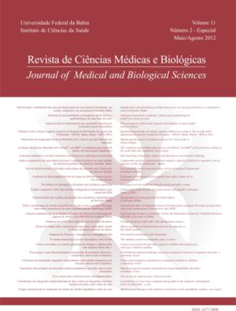Psicoterapia versus farmacoterapia no tratamento do transtorno obsessivo-compulsivo: uma revisão sistemática
DOI:
https://doi.org/10.9771/cmbio.v11i2.6696Keywords:
Transtorno obsessivo-compulsivo. Farmacoterapia. Terapia comportamental. Terapia cognitiva.Abstract
Introdução: O Transtorno Obsessivo-Compulsivo (TOC) é caracterizado pela presença de obsessões e compulsões e causam prejuízo funcional e sofrimento significativo ao sujeito. Os tratamentos de primeira escolha para o TOC são os inibidores seletivos da recaptação da serotonina (ISRS) e a psicoterapia (comportamental ou cognitivo-comportamental), utilizando, principalmente, Exposição e Prevenção de Respostas (EPR). Objetivo: Revisar sistematicamente os artigos publicados nos últimos 15 anos que comparam a eficácia da psicoterapia versus a farmacoterapia no tratamento do TOC. Metodologia: Os artigos foram buscados nos bancos de dados PubMed/Medline e Web of Science, com os termos obsessive compulsive disorder, pharmacotherapy e cognitive behavior therapy.. Foram selecionados ensaios clínicos que comparassem ambas as terapias no período de janeiro de 1997 a agosto de 2012. Resultados: Foram incluídos 13 artigos. Seis artigos apontaram que a combinação de ambas as terapias é melhor que a monoterapia, para a redução dos sintomas do TOC (n=6); outros afirmaram que o tratamento combinado não difere da monoterapia (n=4). Alguns estudos apontaram que a psicoterapia é mais eficaz que o fármaco (n=3), enquanto outros indicaram que não há diferenças significativas entre as intervenções (n=4). Conclusão: As técnicas psicoterapêuticas mostram-se eficientes por si só, no tratamento do TOC. A técnica mais empregada é a EPR. A combinação entre fármaco e psicoterapia parece ser o tratamento ideal para o sujeito com TOC, pois juntas modificam mais os sintomas, o que parece ter maior duração do que apenas a utilização do fármaco.
Abstract
Introduction: Obsessive-Compulsive Disorder (OCD) is characterized by the presence of obsessions and compulsions, and cause significant distress and functional impairment to the subject. The treatments of first choice for OCD is the selective serotonin reuptake inhibitors and psychotherapy (behavioral or cognitive-behavioral), using mainly Exposure with Response Prevention (ERP). Objective: To systematically review the articles published in the last 15 years comparing the effectiveness of psychotherapy versus pharmacotherapy in the treatment of OCD. Methods: Articles were searched on the databases PubMed / Medline and Web of Science, with terms obsessive compulsive disorder, pharmacotherapy and cognitive behavior therapy. Were included trials that compared the two therapies in the period of January of 1997 to august of 2012. Results: Were included 13 articles. Six studies showed that the combination of both therapies is better than the monotherapy in the reduction of OC symptoms (n = 6), other, said combined treatment does not differ from monotherapy (n = 4). Some studies have indicated that psychotherapy is more effective than the drug (n = 3), while others indicated that no significant differences between the interventions (n = 4). Conclusion: Psychotherapeutic techniques prove to be effective alone for the treatment of OCD. The most common technique is the ERP. The combination of psychotherapy and drug therapy appears to be ideal for the subject with OCD, because together modify more the symptoms, which seems to be more duration than just the of drug use.
Downloads
Downloads
Published
How to Cite
Issue
Section
License
The Journal of Medical and Biological Sciences reserves all copyrights of published works, including translations, allowing, however, their subsequent reproduction as transcription, with proper citation of source, through the Creative Commons license. The periodical has free and free access.


